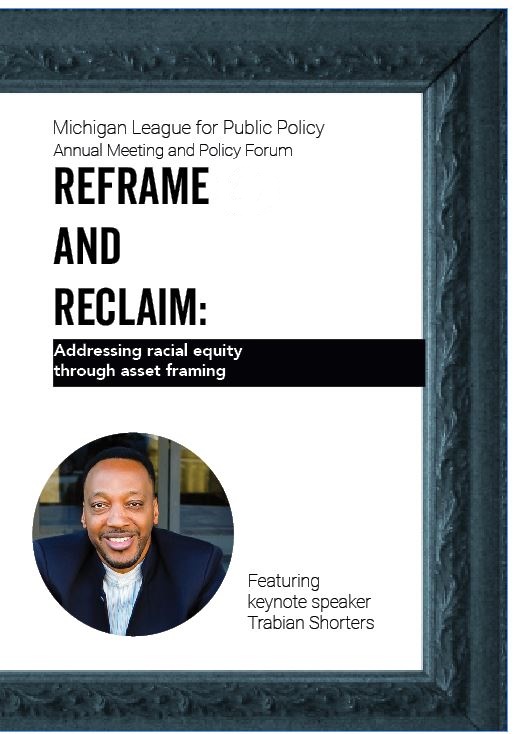This column originally appeared in Michigan Advance on August 30, 2019.
Seeing all those back-to-school posts on Facebook is making me more than a little misty this year.
As a mom, I know my days of having a “little kid” are dwindling. And as a former teacher, I feel a rush of emotions. Guilt about not being there for my students. Sadness about missing out on their stories, their experiences. Concern over all the challenges they’ll face. Enthusiasm for all the things they’ll accomplish this year.
But I have to admit I won’t miss the pressure.

Teachers make more than 1,500 educational decisions every day. That’s four decisions each minute, most of them made in the moment, most of them made under pressure. A lot of what we learn in teacher preparation classes, believe it or not, isn’t how to laminate posters and color inside the lines. It’s how to navigate a classroom in which we’re the trusted adult. And while we learn a lot in those classes and on the job, we get a lot wrong, too.
That’s just one of the reasons teaching is such a stressful profession. Regardless of whether our hearts are in the right place, the odds are pretty high that some of those thousands of decisions are going to be, well, wrong. And the start of the school year, when we’re just developing relationships with our kiddos, is the time when I always felt most likely to fumble.
So when I saw the description of the League’s 2019 policy forum, I thought to myself, “Damn! I wish I’d known about this when I was teaching.” Our policy forum is a free, annual event that draws hundreds of attendees from all over the state to learn innovative approaches to addressing social and political issues.
At the League, we strive to achieve economic, social and racial justice through our research and advocacy work. And if you’ve never been to our policy forums, I’m here to tell you they’re inspiring — and constructive. This year will certainly be, as the topic, presented by nationally renowned keynote speaker Trabian Shorters, deals with “asset framing.”
What is asset framing, exactly? Well, it’s the idea that we should define people by their strengths and potential, not by the ways in which they are disadvantaged. In a world where we’re inundated with terms like “low-income” and “struggling” and “high-risk” and “vulnerable,” we can get caught up in labels that define our kids’ challenges and lose sight of what makes them shine.
Before school starts, teachers are usually asked to examine student data, looking for “achievement gaps” and “academic challenges” in order to identify how to help them grow — a noble and worthy plan, of course. And as the year goes on, we begin to know more about our students and what makes them special.
But why do we only focus on kids’ challenges before we meet them? If we’re going to look at their standardized test scores, we should also spend time looking at all the ways in which we can see them. Do they love singing? Playing soccer? Fishing? Baking? Solving equations? Writing poetry? Painting? How can I use those strengths to help them grow as students?
If we focus on what students lack, we’re missing out on so many amazing things kids can do. That’s why asset framing, which really just asks us to shift the way we view people, is so important. Instead of using language that stigmatizes and focuses on the negative, we can make the decision to highlight value, worth and positivity.
As our little kids head back to school, they’re going to hear about the basics of asset framing, just as we did at a young age: Treat everyone equally and with kindness. Keep an open mind. Don’t judge one another or make assumptions.
And speaking again from a teacher’s perspective, know that how you talk to and about kids — and all people — influences how they think about themselves.
This last point is just as relevant in my current work in communications with the League as it was in my teaching career. As a data-driven organization, we rely on numbers a lot. But they still only tell part of the story.
Our efforts to promote economic security and racial equity often mean we’re talking about the challenges facing Michiganders with low incomes and residents of color and the dramatic data disparities in their well-being. But it also continues to attach a negative connotation to being a person of color or someone dealing with poverty and their experiences, leading people to feel like nothing can be done to change things.
But we’re trying to make improvements for all Michigan residents through better public policy, which is why asset framing is such a valuable tool.
 Trabian Shorters, the man behind the concept of asset framing, is the founder of BMe Community, a national network that runs fellowships for Black people and invests in aspiring communities.
Trabian Shorters, the man behind the concept of asset framing, is the founder of BMe Community, a national network that runs fellowships for Black people and invests in aspiring communities.
When he started BMe, Shorters found that many partners were urging him to focus on the problems that Black men face, not on the assets they bring. In a June 2019 article in the Chronicle of Philanthropy, Shorters wrote, “This is not only insulting, it’s inaccurate and ineffective. Eighty-two percent of black men in America are not poor, and 57 percent are solidly middle class. They serve our country in uniform at the highest rates and are the most actively engaged fathers in the nation, according to federal statistics. So why does philanthropy only convey the image that they are absent or a problem or a threat?”
As we all work in our classrooms, our communities or our Capitol to create equitable outcomes for all, Shorters encourages us to start by defining people by their aspirations, not their challenges. It’s a decision that can make a huge difference.
We all make decisions — whether as parents, friends, teachers, neighbors or colleagues — that impact the people around us. Sometimes creating change includes changing how we think and approach issues. Let’s take this opportunity to grow and adjust the way we see each other, so we can make those decisions with a better focus.
The Michigan League for Public Policy will hold its annual policy forum, Reframe and Reclaim: Addressing racial equity through asset framing, at 1 p.m. Nov. 12 at the Radisson Hotel in Lansing.




 Emily Jorgensen joined the Michigan League for Public Policy in July 2019. She deeply cares about the well-being of individuals and families and has a great love for Michigan. She is grateful that her position at the League enables her to combine these passions and work to help promote policies that will lead to better opportunities and security for all Michiganders.
Emily Jorgensen joined the Michigan League for Public Policy in July 2019. She deeply cares about the well-being of individuals and families and has a great love for Michigan. She is grateful that her position at the League enables her to combine these passions and work to help promote policies that will lead to better opportunities and security for all Michiganders. Jacob Kaplan
Jacob Kaplan 


 Mikell Frey is a communications professional with a passion for using the art of storytelling to positively impact lives. She strongly believes that positive social change can be inspired by the sharing of data-driven information coupled with the unique perspectives of people from all walks of life across Michigan, especially those who have faced extraordinary barriers.
Mikell Frey is a communications professional with a passion for using the art of storytelling to positively impact lives. She strongly believes that positive social change can be inspired by the sharing of data-driven information coupled with the unique perspectives of people from all walks of life across Michigan, especially those who have faced extraordinary barriers.  Rachel Richards rejoined the League in December 2020 as the Fiscal Policy Director working on state budget and tax policies. Prior to returning to the League, she served as the Director of Legislative Affairs for the Michigan Department of Treasury, the tax policy analyst and Legislative Director for the Michigan League for Public Policy, and a policy analyst and the Appropriations Coordinator for the Democratic Caucus of the Michigan House of Representatives. She brings with her over a decade of experience in policies focused on economic opportunity, including workforce issues, tax, and state budget.
Rachel Richards rejoined the League in December 2020 as the Fiscal Policy Director working on state budget and tax policies. Prior to returning to the League, she served as the Director of Legislative Affairs for the Michigan Department of Treasury, the tax policy analyst and Legislative Director for the Michigan League for Public Policy, and a policy analyst and the Appropriations Coordinator for the Democratic Caucus of the Michigan House of Representatives. She brings with her over a decade of experience in policies focused on economic opportunity, including workforce issues, tax, and state budget. Donald Stuckey
Donald Stuckey  Patrick Schaefer
Patrick Schaefer Alexandra Stamm
Alexandra Stamm  Amari Fuller
Amari Fuller

 Renell Weathers, Michigan League for Public Policy (MLPP) Community Engagement Consultant. As community engagement consultant, Renell works with organizations throughout the state in connecting the impact of budget and tax policies to their communities. She is motivated by the belief that all children and adults deserve the opportunity to achieve their dreams regardless of race, ethnicity, religion or economic class.
Renell Weathers, Michigan League for Public Policy (MLPP) Community Engagement Consultant. As community engagement consultant, Renell works with organizations throughout the state in connecting the impact of budget and tax policies to their communities. She is motivated by the belief that all children and adults deserve the opportunity to achieve their dreams regardless of race, ethnicity, religion or economic class.
 Megan Farnsworth joined the League’s staff in December 2022 as Executive Assistant. Megan is driven by work that is personally fulfilling, and feels honored to help support the work of an organization that pushes for more robust programming and opportunities for the residents of our state. She’s excited and motivated to gain overarching knowledge of the policies and agendas that the League supports.
Megan Farnsworth joined the League’s staff in December 2022 as Executive Assistant. Megan is driven by work that is personally fulfilling, and feels honored to help support the work of an organization that pushes for more robust programming and opportunities for the residents of our state. She’s excited and motivated to gain overarching knowledge of the policies and agendas that the League supports.

 Yona Isaacs (she/hers) is an Early Childhood Data Analyst for the Kids Count project. After earning her Bachelor of Science in Biopsychology, Cognition, and Neuroscience at the University of Michigan, she began her career as a research coordinator in pediatric psychiatry using data to understand the impacts of brain activity and genetics on children’s behavior and mental health symptoms. This work prompted an interest in exploring social determinants of health and the role of policy in promoting equitable opportunities for all children, families, and communities. She returned to the University of Michigan to complete her Masters in Social Work focused on Social Policy and Evaluation, during which she interned with the ACLU of Michigan’s policy and legislative team and assisted local nonprofit organizations in creating data and evaluation metrics. She currently serves as a coordinator for the Michigan Center for Youth Justice on a project aiming to increase placement options and enhance cultural competency within the juvenile justice system for LGBTQIA+ youth. Yona is eager to put her data skills to work at the League in support of data-driven policies that advocate for equitable access to healthcare, education, economic security, and opportunity for 0-5 year old children. In her free time, she enjoys tackling DIY house projects and trying new outdoor activities with her dog.
Yona Isaacs (she/hers) is an Early Childhood Data Analyst for the Kids Count project. After earning her Bachelor of Science in Biopsychology, Cognition, and Neuroscience at the University of Michigan, she began her career as a research coordinator in pediatric psychiatry using data to understand the impacts of brain activity and genetics on children’s behavior and mental health symptoms. This work prompted an interest in exploring social determinants of health and the role of policy in promoting equitable opportunities for all children, families, and communities. She returned to the University of Michigan to complete her Masters in Social Work focused on Social Policy and Evaluation, during which she interned with the ACLU of Michigan’s policy and legislative team and assisted local nonprofit organizations in creating data and evaluation metrics. She currently serves as a coordinator for the Michigan Center for Youth Justice on a project aiming to increase placement options and enhance cultural competency within the juvenile justice system for LGBTQIA+ youth. Yona is eager to put her data skills to work at the League in support of data-driven policies that advocate for equitable access to healthcare, education, economic security, and opportunity for 0-5 year old children. In her free time, she enjoys tackling DIY house projects and trying new outdoor activities with her dog.

 Amber Bellazaire joined the Michigan League for Public Policy as a policy analyst in June of 2019. Her work primarily focuses on state policy and budgets affecting Michigan’s Medicaid programs. Previously, Amber worked at the National Conference of State Legislatures tracking legislation and research related to injury and violence prevention, adolescent health, and maternal and child health. She also brings with her two years of Americorps service. As a full time volunteer, Amber had the opportunity to tutor high school students in Chelsea, Massachusetts and address issues of healthcare access and food insecurity through in-person outreach in Seattle, Washington.
Amber Bellazaire joined the Michigan League for Public Policy as a policy analyst in June of 2019. Her work primarily focuses on state policy and budgets affecting Michigan’s Medicaid programs. Previously, Amber worked at the National Conference of State Legislatures tracking legislation and research related to injury and violence prevention, adolescent health, and maternal and child health. She also brings with her two years of Americorps service. As a full time volunteer, Amber had the opportunity to tutor high school students in Chelsea, Massachusetts and address issues of healthcare access and food insecurity through in-person outreach in Seattle, Washington.
 Simon Marshall-Shah joined the Michigan League for Public Policy as a State Policy Fellow in August 2019. His work focuses on state policy as it relates to the budget, immigration, health care and other League policy priorities. Before joining the League, he worked in Washington, D.C. at the Association for Community Affiliated Plans (ACAP), providing federal policy and advocacy support to nonprofit, Medicaid health plans (Safety Net Health Plans) related to the ACA Marketplaces as well as Quality & Operations.
Simon Marshall-Shah joined the Michigan League for Public Policy as a State Policy Fellow in August 2019. His work focuses on state policy as it relates to the budget, immigration, health care and other League policy priorities. Before joining the League, he worked in Washington, D.C. at the Association for Community Affiliated Plans (ACAP), providing federal policy and advocacy support to nonprofit, Medicaid health plans (Safety Net Health Plans) related to the ACA Marketplaces as well as Quality & Operations.






